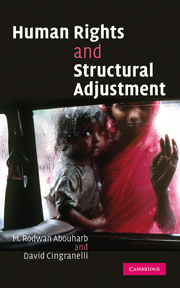Book contents
- Frontmatter
- Contents
- List of figures
- List of tables
- Acknowledgments
- Part I The argument
- Part II Estimating the human rights effects of structural adjustment
- Part III Findings
- 6 Economic and social rights
- 7 Civil conflict: demonstrations, riots, and rebellion
- 8 Torture, murder, disappearance, and political imprisonment
- 9 Worker rights
- 10 Democracy and civil liberties
- Part IV Conclusion
- Bibliography
- Author index
- Subject index
7 - Civil conflict: demonstrations, riots, and rebellion
Published online by Cambridge University Press: 30 June 2009
- Frontmatter
- Contents
- List of figures
- List of tables
- Acknowledgments
- Part I The argument
- Part II Estimating the human rights effects of structural adjustment
- Part III Findings
- 6 Economic and social rights
- 7 Civil conflict: demonstrations, riots, and rebellion
- 8 Torture, murder, disappearance, and political imprisonment
- 9 Worker rights
- 10 Democracy and civil liberties
- Part IV Conclusion
- Bibliography
- Author index
- Subject index
Summary
Introduction
The causes of why people engage in anti-government protest and rebellion are multifaceted (e.g., Fearon and Laitin 2003; Regan and Henderson 2002; Regan and Norton 2005; Sambanis 2004a; 2004b). The reasons for these actions fall into two broad categories. The first concerns groups that take action for political reasons, choosing their moment to take advantage of governmental weakness. Second, groups take action against their government because they have fared poorly under its economic policies. This research demonstrates that the consequences of World Bank and International Monetary Fund involvement in the governance of developing countries increase the probability of anti-government protest and rebellion along two dimensions already highlighted in the civil conflict literature. The first describes how the involvement of these international financial institutions constitutes a marker of government weakness increasing the probability of rebellion as opposition groups sanction violent attacks to take advantage of this situation for their own political advantage. The second concerns the deleterious economic consequences of these agreements on developing countries. The consequences of these programs increase levels of hardship for many people in countries undergoing structural adjustment. Many more citizens, as a result, have been harshly treated by their governments leading to greater amounts of anti-government protest and rebellion as people try to change government policy to improve their personal circumstances.
The evidence presented later provides support for these arguments linking the negotiation of structural adjustment agreements with an increased probability of rebellion.
- Type
- Chapter
- Information
- Human Rights and Structural Adjustment , pp. 150 - 169Publisher: Cambridge University PressPrint publication year: 2007

